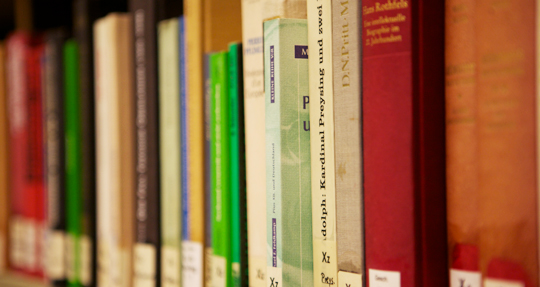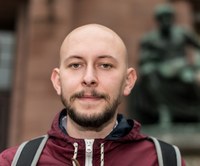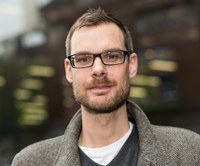Reads of a Lifetime
Freiburg, May 10, 2017

Photo: Baschi Bender
The works of Heinrich Mann, Kurt Tucholsky, Erich Maria Remarque and Erich Kästner were burned along with thousands of other books on 10 May 1933 by the National Socialists. All over Germany, the Nazis destroyed literature written by authors who were accused of being "un-German." Organized by the German Student Union (Deutsche Studentenschaft), the book burning marked the start of open persecution of Jewish, pacifist, Marxist, and other authors opposed to the Nazis. Since 1947, on 10 May Germany has marked the anniversary of the event with the Tag des freien Buches (Day of the Free Book), which is intended simultaneously to honor freedom of speech and opinion and diversity of the written word. Mariella Hutt asked University of Freiburg students: "Which book left its mark on you?"
 "I really loved Kafka on the Shore, by Haruki Murakami. I believe it's because every reader understands the book differently. The story is surreal and often plays with the boundaries between dream and reality, which can be confusing. The writing style is really special as well. The novel is subjectively, yet at the same time creatively written, which is why I would recommend the book to anyone who likes to read something different now and then and has a desire to interpret the book in their own way."
"I really loved Kafka on the Shore, by Haruki Murakami. I believe it's because every reader understands the book differently. The story is surreal and often plays with the boundaries between dream and reality, which can be confusing. The writing style is really special as well. The novel is subjectively, yet at the same time creatively written, which is why I would recommend the book to anyone who likes to read something different now and then and has a desire to interpret the book in their own way."
Gentian Gashi is studying Economics.
(Photo Patrick Seeger)
 "The Kite Runner, by Khaled Hosseini, had a big influence on me. It takes place in Afghanistan and the US and tells the story of two boys from very different social classes. As you read, you learn something about the life in and people of Afghanistan. I learned a great deal about how a person can handle their own feelings of guilt and how it is possible to forgive. Besides, the book showed me to be true to myself and not to force myself to feel something I don't really feel."
"The Kite Runner, by Khaled Hosseini, had a big influence on me. It takes place in Afghanistan and the US and tells the story of two boys from very different social classes. As you read, you learn something about the life in and people of Afghanistan. I learned a great deal about how a person can handle their own feelings of guilt and how it is possible to forgive. Besides, the book showed me to be true to myself and not to force myself to feel something I don't really feel."
Jinna Honkanen is a German Studies student.
(Photo Patrick Seeger)
 "Jonas Jonasson's The Hundred-Year-Old Man Who Climbed Out the Window and Disappeared impressed me. The special thing about the novel is that it has two narrative strands. One is the escape of the old man, which is described with a great deal of humor. The other features historical flashbacks that are built into the story every now and then. By reading it, I incidentally learned a great deal about important events of the 20th century. That's why I think the book is super in particular for anyone who is interested in history."
"Jonas Jonasson's The Hundred-Year-Old Man Who Climbed Out the Window and Disappeared impressed me. The special thing about the novel is that it has two narrative strands. One is the escape of the old man, which is described with a great deal of humor. The other features historical flashbacks that are built into the story every now and then. By reading it, I incidentally learned a great deal about important events of the 20th century. That's why I think the book is super in particular for anyone who is interested in history."
Josefine Hench is studying Educational Science.
(Photo Patrick Seeger)
 "A book that inspired me to stretch my intellectual limits is the novel Berlin Alexanderplatz by Alfred Döblin. It's all about breaking with traditions and daring to try something new. I like texts that try to achieve something different, that try to experiment – as does Döblin's book. I think it's really exciting the way he makes the big-city atmosphere of the 20th century real through storytelling. But you do have to be careful not to let yourself be ideologically influenced by the story."
"A book that inspired me to stretch my intellectual limits is the novel Berlin Alexanderplatz by Alfred Döblin. It's all about breaking with traditions and daring to try something new. I like texts that try to achieve something different, that try to experiment – as does Döblin's book. I think it's really exciting the way he makes the big-city atmosphere of the 20th century real through storytelling. But you do have to be careful not to let yourself be ideologically influenced by the story."
Marc Wurich is getting a Ph.D. in German Studies
(Photo Patrick Seeger)
 "I really liked the novella by Theodor Storm, The Rider on the White Horse. I have a special connection to this book, because it takes place in North Friesland. My mother comes from the region and I spent a great deal of time there as a child. What I think is really exciting is that the book questions many concepts that were taken for granted in the 19th century. What really impressed me as I read was how the topic of religion was treated and that it presented an alternative to 'one God.'"
"I really liked the novella by Theodor Storm, The Rider on the White Horse. I have a special connection to this book, because it takes place in North Friesland. My mother comes from the region and I spent a great deal of time there as a child. What I think is really exciting is that the book questions many concepts that were taken for granted in the 19th century. What really impressed me as I read was how the topic of religion was treated and that it presented an alternative to 'one God.'"
Clara Berger is studying Liberal Arts and Sciences.
(Photo Patrick Seeger)

